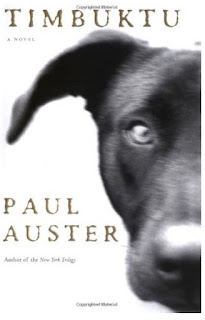Timbuktu
Paul Auster is one of my favourite authors, and so even when I don’t think one of his books is as good (read engaging, moving, strange) as another, I find it hard to criticise. That’s okay – I am a reader rather than a professional reviewer, and I can just voice what I understood about the book and hint at some dissatisfaction, with sending the dog to the kennel without supper.
The starting point is that this is a story about a man and a
dog. At first, it is more about the man, a dysfunctional Brooklyn poet who has
taken a Santa Claus vow to be helpful to others. We wonder - along with our
narrator, Mr Bones – whether Willy G Christmas will survive long enough to meet
his old teacher and mentor, Bea Swanson, and what it will mean if he does. There
is some urgency here, since ‘the smell of death had settled upon Willy G
Christmas, and as surely as the sun was a lamp in the clouds that went off and
on every day, the end was drawing near’.
I’m not sure about other readers, but I think technically it’s
hard to get inside a character in an empathetic sense when you see him
indirectly from a dog’s point of view. We do hear Willy’s voice, quite a lot in
the early part of the novel, as Mr Bones recalls their conversations. However,
the narrative is also mixed in with canine dreams and follows a short-version
of the picaresque novel (like Mr Vertigo,
following a younger character and an eccentric older man). In this sense, the
novel centres on Mr Bones himself, as he contemplates his lonely fate, hunts
for food, is temporarily adopted by a Chinese boy, and eventually finds a
family to call his own (though there are costs to his masculinity in that
operation).
At one point, Willy laments that he hasn’t taught Mr Bones
to read and wonders if there would be ‘riots on the streets’ if the blasphemous
idea that dogs are as smart as men got out there in the world. Then the police arrive and Mr Bones’ earlier dream about his owner’s demise begins
to unfold before his eyes. This is a typical Auster trick, one which walks the
line of coincidence and something stranger operating in the universe, a
fateful tale which is rich in irony and represents all of our lives, like the half-told
tales that they are, perhaps even when grand, 'signifying nothing'.
And as I write this, then, I wonder if I am missing
something, if the book is indeed a sort of fable about unrealised human
potential, though I am no surer at the end of the book if this was Mr Auster’s
intention. To stand back from the story a minute, one can think about an
unpublished poet, his illiterate friend, homelessness and immigrants with
profound stories of desperate loss and escape – in this case, from the
holocaust – and yet death comes and sometimes, suicide. And then I think about
all those voices, not the ones of novelists whose words, like Auster’s, echo
around the world in fine print, but lost voices with no more lasting impact
than a dying dog’s last bark. And I wonder if this may be the sort of
metaphoric reading that leaves me with a tinge of sadness, as well as
frustration, when the tale wags its last tail, and … all the rest is silence.
(See also my thoughts on 4321, The Book of Illusions, Oracle Night




Comments
Post a Comment